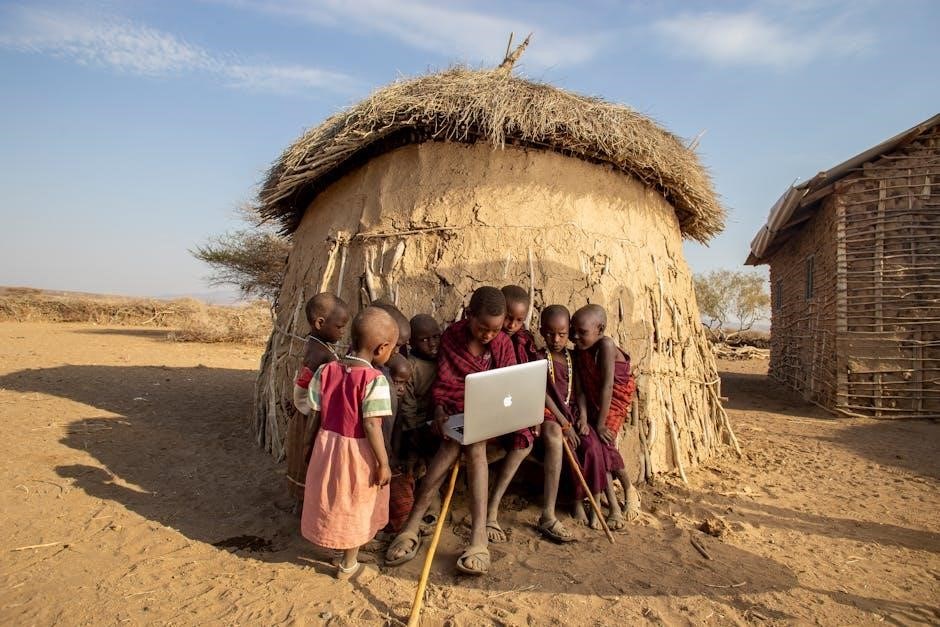The 7th edition of Essentials of Life-Span Development by Robert S․ Feldman offers a comprehensive exploration of human development from conception to late adulthood․ It integrates cutting-edge research, practical applications, and real-world examples to provide students with a deeper understanding of developmental processes․ The textbook emphasizes critical thinking, cultural diversity, and the interplay of biological, psychological, and social factors․ With updated content and a user-friendly design, it remains a valuable resource for both students and educators in the field of developmental psychology․
Overview of the Textbook
Essentials of Life-Span Development, 7th Edition by Robert S․ Feldman provides a concise yet thorough examination of human development across the lifespan․ Organized chronologically, the textbook covers key topics from prenatal development to late adulthood, emphasizing cultural diversity and the interplay of biological, psychological, and social influences․ It features engaging case studies, critical thinking prompts, and real-world applications to enhance learning․ Updated research and a focus on practical implications make it an indispensable resource for students and professionals in developmental psychology․
Key Features of the 7th Edition
The 7th edition of Essentials of Life-Span Development includes updated research, enhanced visuals, and interactive digital tools․ It incorporates real-world applications and diverse perspectives, fostering a deeper understanding of developmental concepts․ New case studies and critical thinking exercises encourage active learning, while the companion website offers multimedia resources to supplement coursework․ The edition also emphasizes cultural sensitivity and the practical implications of developmental psychology, making it a versatile and engaging resource for students․

Understanding Life-Span Development
Life-span development explores human growth from conception to late adulthood, examining biological, psychological, and social changes across stages․ It emphasizes cultural influences and individual differences, providing a holistic view of development․
Definition and Scope
Life-span development is the scientific study of human growth and development from conception to death, examining biological, psychological, and social changes across the lifespan․ It explores how individuals develop, adapt, and interact with their environment, influenced by factors like genetics, culture, and socioeconomic status․ This field provides a comprehensive understanding of developmental processes, offering insights into optimizing human potential across all life stages․
Importance of Studying Life-Span Development
Studying life-span development is crucial for understanding human growth and adaptation across all stages․ It provides insights into biological, psychological, and social changes, enabling professionals to address developmental challenges effectively․ This knowledge aids in creating supportive environments for individuals at every life stage, from education to mental health․ Understanding lifespan development fosters empathy, informs policy-making, and promotes holistic well-being, making it essential for improving quality of life across diverse populations and contexts․

Theoretical Perspectives in Life-Span Development
Theoretical perspectives in life-span development provide frameworks for understanding human growth and behavior․ They include psychosexual, psychosocial, and cognitive theories, guiding research and applications across the lifespan․
Major Theories and Their Contributions
Major theories in life-span development include Freud’s psychosexual theory, Erikson’s psychosocial stages, Piaget’s cognitive development, and Bandura’s social learning theory․ Each provides unique insights into human growth, shaping understanding of mental, emotional, and behavioral development․ These theories guide research, education, and interventions, emphasizing the role of nature, nurture, and socio-cultural influences across the lifespan․
Integrating Theories in Modern Research
Modern research integrates various developmental theories to provide a holistic understanding of growth across the lifespan․ By combining perspectives like cognitive, social, and biological theories, researchers create comprehensive models․ This approach addresses complex developmental issues, offering insights into real-world applications․ Integrating theories fosters innovation, enabling researchers to explore how factors like culture and environment interact․ This multi-theoretical approach enhances the validity and relevance of studies in life-span development․

Research Methods in Life-Span Development
Research in life-span development employs qualitative and quantitative methods, including longitudinal and cross-sectional studies, to examine growth and changes across the lifespan, ensuring comprehensive insights․
Qualitative vs․ Quantitative Approaches
Qualitative research focuses on in-depth understanding through non-numerical data, such as interviews and observations, while quantitative research relies on statistical analysis of numerical data․ Qualitative methods explore experiences and perspectives, offering rich, detailed insights, whereas quantitative approaches identify patterns and trends across large samples․ Both methods are essential in life-span development research, providing complementary views of growth and change across the lifespan․ The 7th edition emphasizes the value of integrating these approaches for comprehensive understanding․
Designing Longitudinal and Cross-Sectional Studies
Longitudinal studies track the same individuals over time, offering insights into developmental changes and patterns․ Cross-sectional studies examine different age groups at a single point, highlighting variations across stages․ Both methods are crucial in life-span development research․ Longitudinal designs provide depth on individual growth, while cross-sectional approaches reveal broader trends․ The 7th edition discusses how these complementary approaches enhance understanding of human development across the lifespan․

Developmental Stages
Developmental stages encompass prenatal development, childhood, adolescence, adulthood, and aging․ Each stage uniquely influences growth, highlighting physical, cognitive, and emotional milestones essential for understanding human development across the lifespan․
Prenatal Development and Birth
Prenatal development spans conception to birth, divided into germinal, embryonic, and fetal stages․ The germinal stage involves cell division, while the embryonic stage focuses on organ formation․ The fetal stage emphasizes growth and maturation․ Birth marks the transition to postnatal life, influenced by genetics and environmental factors like nutrition and maternal health․ Understanding these processes is crucial for appreciating early human development and its lifelong impact․
Childhood and Adolescence
Childhood and adolescence are critical periods marked by significant physical, cognitive, and socio-emotional growth․ Early childhood sees rapid language development and motor skill refinement, while middle childhood focuses on social and cognitive advancements․ Adolescence brings puberty, identity formation, and increased independence․ These stages are shaped by family, peers, and cultural influences, laying the foundation for future development․ Understanding these transitions is essential for fostering healthy growth and addressing potential challenges․
Adulthood and Aging
Adulthood and aging encompass significant physical, cognitive, and socio-emotional changes․ Young adulthood focuses on independence and career development, while middle adulthood involves reflection and generativity․ Late adulthood brings physical decline, cognitive shifts, and emotional resilience․ Aging individuals often experience life satisfaction, despite challenges like health issues and loss․ Understanding these stages helps address age-related needs and promote healthy aging across the life span, emphasizing the importance of adaptability and social support․

Factors Influencing Development
Development is shaped by biological, environmental, cultural, and socioeconomic factors․ These influences interact across the life span, impacting physical, cognitive, and emotional growth in complex ways․
Biological and Environmental Influences
Biological factors, such as genetics and brain development, significantly impact growth and behavior․ Environmental influences, including family, culture, and socioeconomic status, also shape development․ These interactions determine physical, cognitive, and emotional outcomes across the life span, highlighting the complexity of human development․
Cultural and Socioeconomic Factors
Cultural and socioeconomic factors profoundly shape human development, influencing values, beliefs, and opportunities․ Culture determines practices like education and family roles, while socioeconomic status affects access to resources and experiences․ These factors interact with biological and psychological processes, creating diverse developmental pathways․ Understanding their impact is crucial for fostering inclusive and equitable support systems across the life span․
Cognitive and Emotional Development
Cognitive development involves the growth of mental processes like memory, problem-solving, and decision-making․ Emotional development encompasses the evolution of emotional awareness, regulation, and intelligence․ Both processes are influenced by biological maturation and environmental interactions, shaping how individuals understand and navigate their world across the life span․
Stages of Cognitive Development
Jean Piaget’s theory outlines four stages of cognitive development: Sensorimotor (birth–2 years), Preoperational (2–7 years), Concrete Operational (7–11 years), and Formal Operational (12+ years)․ Each stage represents significant advancements in thinking, problem-solving, and understanding the world․ The 7th edition explores these stages, emphasizing how children construct knowledge and adapt to their environment․ Modern research extends Piaget’s work, highlighting cultural and individual variations in cognitive growth across the life span․
Emotional Intelligence and Well-Being
Emotional intelligence (EI) refers to the ability to recognize, understand, and manage one’s emotions and those of others․ It plays a crucial role in mental health, relationships, and overall well-being․ The 7th edition discusses how EI develops across the life span, influencing stress management, empathy, and social interactions․ Higher EI is linked to greater life satisfaction, resilience, and emotional regulation․ The text also explores strategies to enhance EI, promoting healthier emotional and psychological outcomes across various stages of life․

Applications of Life-Span Development
Life-span development insights are applied in education, healthcare, and policy-making, enhancing programs and policies that support individuals across all life stages, fostering healthier, productive societies․
Educational and Career Development
Understanding life-span development informs educational strategies, helping tailor learning experiences for different age groups․ It guides career counseling by aligning individual strengths with professional paths, fostering adaptability and growth․ The 7th edition emphasizes applying developmental principles to enhance educational outcomes and career satisfaction, ensuring supportive environments for learners of all ages to thrive and reach their full potential throughout their lives․
Mental Health and Wellness
The 7th edition emphasizes the role of mental health in overall well-being across the lifespan․ It explores how developmental stages influence emotional resilience and vulnerability to disorders; The textbook highlights evidence-based interventions and the importance of early interventions to promote lifelong mental wellness․ By integrating psychological theories with real-world applications, it provides insights into fostering healthy emotional development and addressing challenges at every life stage effectively․

Current Trends and Future Directions
Emerging technologies and interdisciplinary approaches are reshaping lifespan development research, emphasizing cultural diversity and longitudinal studies․ Future directions focus on integrating AI and global perspectives to enhance understanding․
Emerging Research Areas
Emerging research in life-span development focuses on AI’s role in studying human growth, cultural diversity, and global perspectives․ Advances in neuroscientific methods and social-emotional learning are key areas․ These trends emphasize technology’s impact on developmental studies, offering new insights into cognitive and emotional processes across the lifespan․ By integrating innovative tools and diverse viewpoints, researchers aim to create a more comprehensive understanding of human development․
Technology’s Role in Developmental Studies
Technology significantly enhances life-span developmental research by providing innovative tools for data collection and analysis․ Digital platforms enable longitudinal tracking of developmental milestones, while AI and machine learning offer deeper insights into complex datasets․ Wearables and mobile apps collect real-time behavioral and physiological data, enriching studies on aging, cognition, and emotional development․ Virtual reality also aids in simulating real-world environments for research on human growth and adaptation across the lifespan․

Cultural Considerations in Development
Cultural considerations play a crucial role in understanding life-span development, influencing behaviors, values, and developmental milestones across diverse societies, emphasizing the importance of cultural sensitivity in research․
Diverse Perspectives and Practices
Diverse perspectives and practices highlight how cultural differences shape developmental experiences, influencing values, beliefs, and caregiving practices across societies․ These variations emphasize the importance of understanding and respecting cultural contexts in developmental research and applications․ By integrating diverse viewpoints, researchers gain a holistic understanding of human development, fostering inclusivity and adaptability in addressing developmental challenges across global populations and promoting culturally sensitive interventions that honor individual and collective differences․
Global Implications of Life-Span Development
Understanding life-span development holds global significance as it addresses universal human experiences and cultural variations․ By studying developmental processes across diverse societies, researchers can identify shared milestones and unique practices, fostering cross-cultural collaboration․ This knowledge aids in designing interventions that respect local traditions while promoting global well-being, ensuring equitable opportunities for growth and development worldwide․
The study of life-span development offers profound insights into human growth, emphasizing the integration of biological, psychological, and social influences across all life stages․ By understanding these processes, individuals and societies can foster healthier development and address challenges more effectively, promoting well-being and resilience throughout life․
The 7th edition of Essentials of Life-Span Development provides a detailed overview of human development across all life stages, emphasizing the interplay of biological, psychological, and social factors․ It highlights cultural diversity, real-world applications, and practical examples to illustrate key concepts․ The textbook also explores the significance of critical thinking and the impact of environmental influences on developmental outcomes․ Updated research and a focus on modern issues make it a valuable resource for understanding human growth and development․
Final Thoughts on the Importance of Life-Span Development
Understanding life-span development is crucial for fostering human well-being across all stages of life․ It provides insights into growth, challenges, and opportunities, enabling individuals and societies to support development effectively․ By studying this field, we gain a deeper appreciation for the complexities of human potential and the ways to promote positive outcomes․ The 7th edition of Essentials of Life-Span Development underscores the enduring value of this knowledge in shaping a compassionate and informed world․

Leave a Reply
You must be logged in to post a comment.